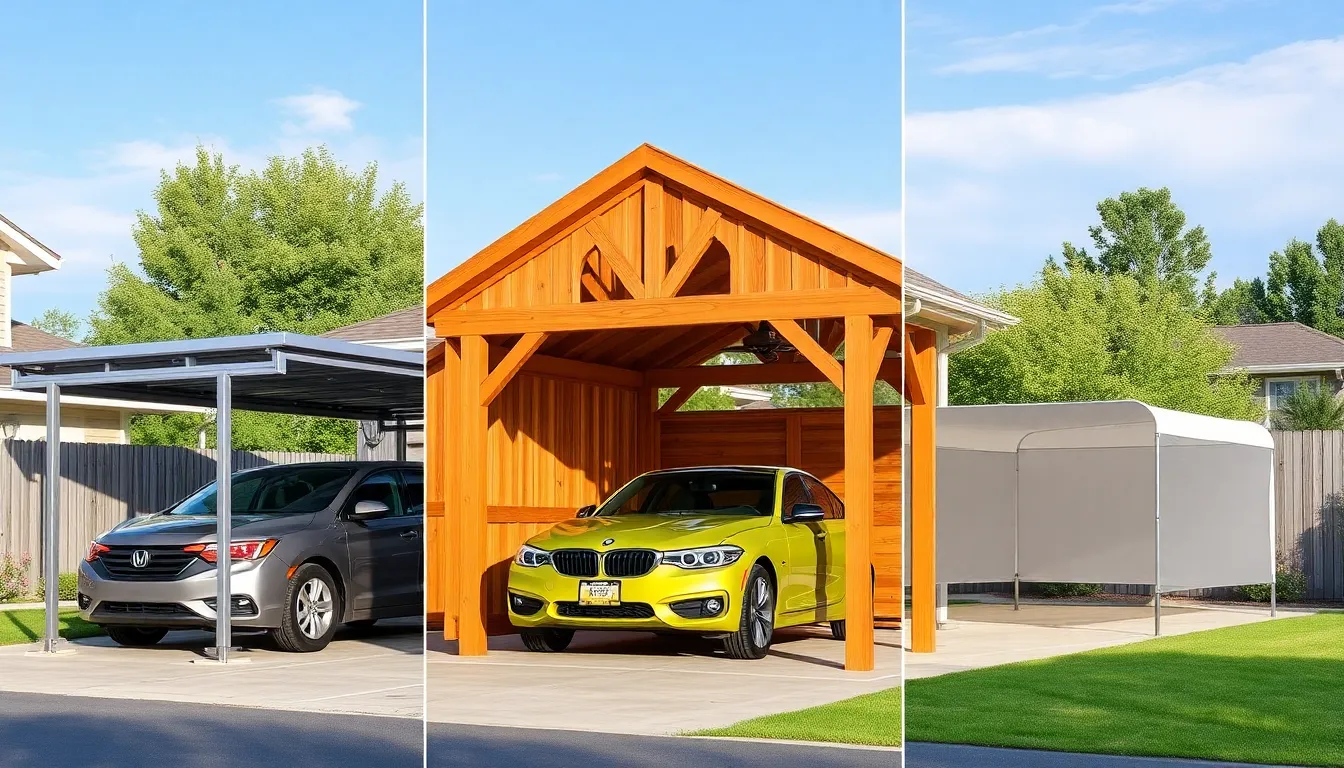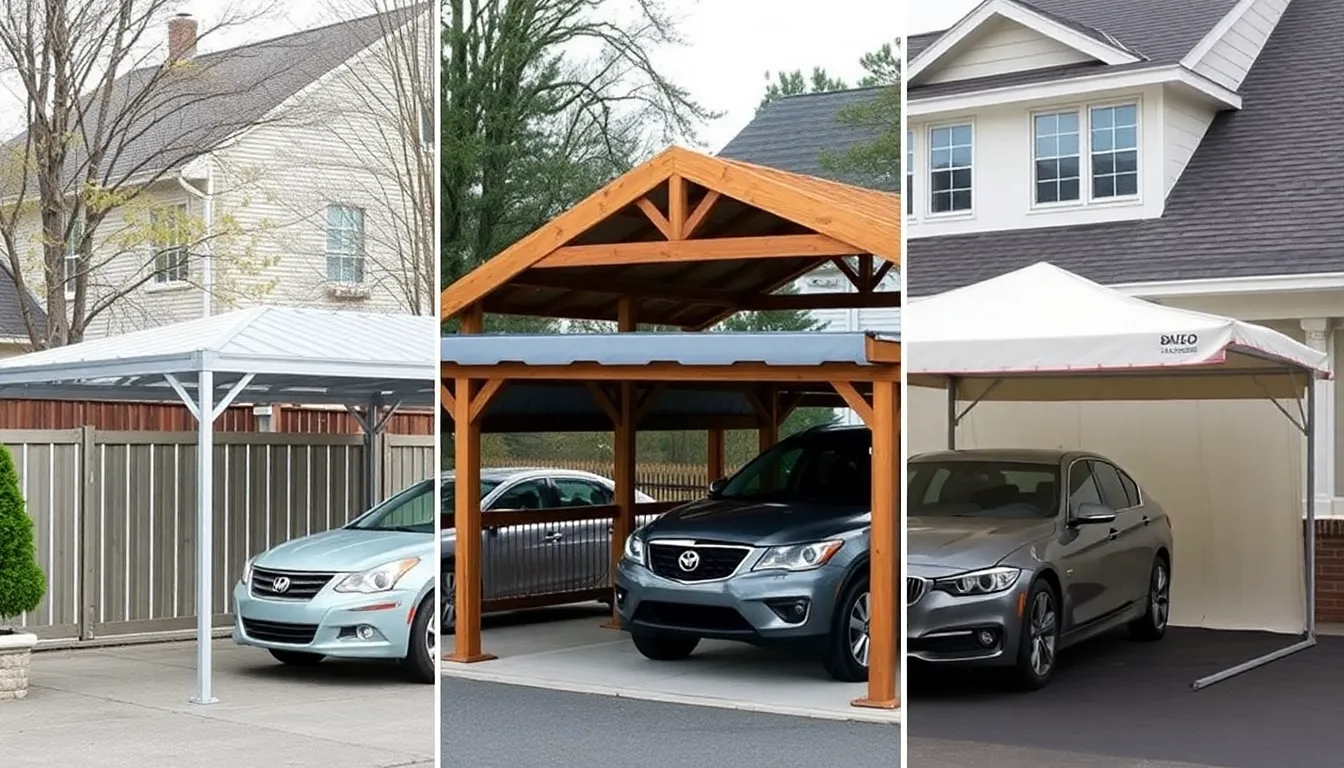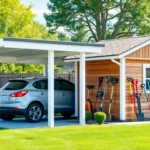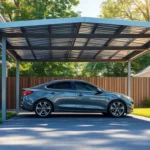Picture this: it’s a rainy Tuesday, and your car looks like it just survived a mud wrestling competition. If only you had a carport! But before you dive into the world of carports, you might wonder how much this protective haven will set you back. Spoiler alert: it’s not as scary as your last trip to the dentist.
How Much Does a Carport Cost
Various elements shape the overall cost of a carport. Understanding these factors helps in making informed financial decisions.
Material Choices
Material selection plays a significant role in carport pricing. For instance, metal options like steel or aluminum tend to provide durability and require less maintenance, resulting in higher initial costs. Wood offers a classic aesthetic but presents frequent upkeep needs and variable pricing depending on local wood types. Additionally, vinyl choices might provide low maintenance with moderate costs. Overall, the chosen material affects longevity, insurance rates, and eventual resale value.
Size and Design
Size and design impact the budget considerably. Standard single-carports usually cost between $1,000 and $3,000. Larger options, such as double or oversized carports, often range from $2,500 to $5,000 or more. Custom designs that incorporate unique features or specific styles can elevate costs significantly. Moreover, adding functionality like storage or integrated lighting also influences pricing. Generally, the size and design determine both materials needed and installation complexity.
Installation Expenses
Installation costs vary based on multiple factors. Professional installation typically ranges from $300 to $1,500, depending on the site location and the contractor’s expertise. DIY installations could save money, yet they require time and skill. Local regulations and permits may also add expenses, ensuring compliance with zoning laws. Environmental considerations, including any necessary site preparation and labor, contribute to overall installation costs. These details play a crucial role in the accurate budgeting of a carport project.
Average Cost of Different Carports


Carports come in various styles, each with distinct price ranges based on materials and construction. Understanding these costs helps in budgeting effectively.
Metal Carports
Metal carports typically cost between $1,000 and $3,000. Prices vary by size, with larger structures costing more. They offer durability against harsh weather conditions, making them a popular choice. Installation usually adds another $300 to $1,500. Materials like steel and aluminum attract buyers due to low maintenance needs. Buyers appreciate their long lifespan of 15 years or more. Choosing galvanized steel enhances rust resistance, adding value over time. Metal carports appeal to those seeking both functionality and cost-effectiveness.
Wooden Carports
Wooden carports generally range from $2,000 to $5,000, influenced by wood types and design complexity. Cedar and redwood options command higher prices due to their aesthetic and durability. Homeowners enjoy the classic look that wood provides, enhancing property curb appeal. Installation costs remain similar to metal options, sitting around $300 to $1,500. Regular maintenance investment ensures longevity, though costs may rise over time. Choosing pressure-treated wood can help resist decay and pests, impacting overall expenses positively.
Fabric Carports
Fabric carports offer a budget-friendly alternative, with prices ranging from $500 to $1,500. They typically come in portable designs, appealing to those needing temporary solutions. While these structures may lack durability compared to metal or wood, they provide quick and easy setup. Lightweight materials make for easy transport, attracting users who prioritize convenience. However, fabric carports do require regular maintenance to ensure they withstand elements, which can affect long-term costs. Additionally, seasonal use prolongs their lifespan, as frequent disassembly may lead to wear and tear.
Additional Expenses to Consider
Several costs beyond the initial purchase price of a carport arise during installation and ownership. Understanding these additional expenses helps homeowners budget effectively.
Permits and Regulations
Local regulations may require permits for carport installation. Fees for these permits vary based on location and type of structure. Homeowners should inquire with local building departments before starting the installation process. Obtaining the necessary permits ensures compliance with zoning laws and may prevent future fines or removal of the structure. In many cases, the cost for permits ranges from $50 to $500, depending on the jurisdiction.
Maintenance Costs
Regular maintenance costs play a role in the overall investment of a carport. Maintenance requirements depend on the material chosen for the carport. For instance, metal carports typically require minimal upkeep, while wooden structures need frequent care to prevent decay. Annual maintenance expenses can range from $100 to $500, depending on the size and complexity of the carport. Budgeting for these ongoing expenses ensures the carport remains in good condition and prolongs its lifespan.
Benefits of Investing in a Carport
Investing in a carport offers multiple advantages beyond mere vehicle protection. Understanding these benefits aids homeowners in making smart choices.
Protecting Your Vehicle
Having a carport shields vehicles from harsh weather, including rain, snow, and UV rays. These structures reduce wear and tear on paint and interiors, prolonging the vehicle’s lifespan. By preventing rust and corrosion, carports minimize repair costs associated with environmental damage. Additionally, carports keep ice and snow off surfaces, saving time during winter months. Investing in a carport reduces the need for costly garage alternatives while providing effective protection.
Increasing Property Value
Adding a carport enhances property value, making homes more appealing to potential buyers. Structures like carports set homes apart in the real estate market, showcasing functionality and convenience. A well-built carport can increase curb appeal and showcase tasteful design choices. Homes with carports often command higher resale prices, providing a return on investment. Local markets may favor properties with such features, making them easier to sell. Utilizing this option contributes an attractive and practical element to any home.
Conclusion
Investing in a carport can be a wise decision for homeowners looking to protect their vehicles and enhance property value. With costs varying based on materials size and installation methods it’s crucial to assess individual needs and budget. A well-planned carport not only safeguards against the elements but also contributes to long-term savings by reducing repair costs.
By considering all factors including initial expenses and ongoing maintenance homeowners can make informed choices that align with their financial goals. Ultimately a carport serves as a practical and valuable addition to any property.


